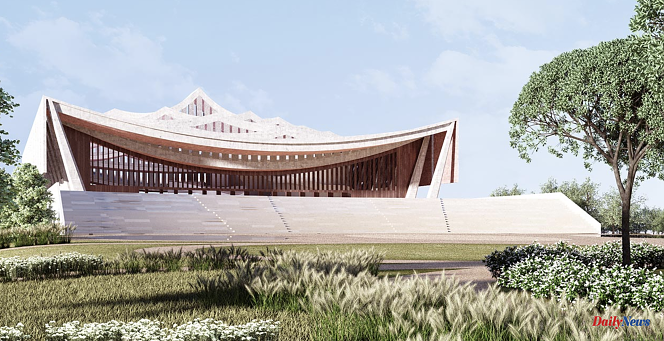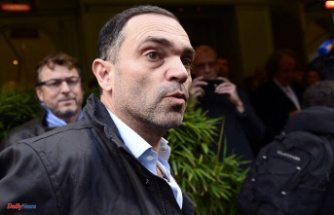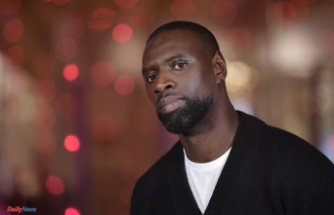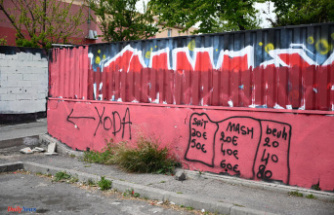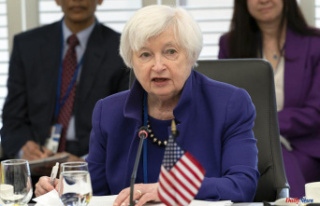In the heart of Accra, a stone's throw from the Ghanaian Parliament, three stationary cranes watch over a stationary site. A long perimeter wall protects the site from view. "There's nothing going on right now, but it's going to be huge here," the keeper mutters, getting up from the plastic chair where he had dozed off lightly. This vast space of some 7 hectares should indeed one day accommodate "the most significant building in the history of Ghana", according to its promoters. And already, even before it came out of the ground, one of the most controversial: a "national cathedral" built by the Ghanaian-British "starchitect" David Adjaye, flanked by gardens, and incorporating a museum of Bible, but also a conference center, shops, restaurants, an art gallery...
Part of public opinion criticizes the excessiveness of the project, at a time when the West African country is shaken by an economic crisis of rare intensity. For months, inflation has been galloping (45% in March) and the debt has exploded, to more than 100% of gross domestic product (GDP), forcing the government to seek aid from the International Monetary Fund (IMF).
In this tense context, the funding granted to the cathedral raised a wind of protest. Although the bulk of future costs must be covered by donations and private funds, up to 58 million dollars (52.2 million euros) of public money has already been spent on this complex. In December 2022, Parliament refused to approve a new allocation of 80 million cedis (6.1 million euros). The works are now suspended, but not the attacks of the opposition, which denounces all-out the mismanagement of the government and a lack of transparency in the process of selection of consultants and companies responsible for carrying out the project.
"For Christians in Africa"
“This cathedral is the most terrible example of the waste of public money that has led us to where we are today,” stings political scientist Emmanuel Gyimah-Boadi, founding president of the pan-African research office Afrobarometer. In reality, the criticisms of the deputies come very late, no doubt because they too wanted to spare the Christian community whose political weight is very important in the country. »
In addition to hosting official ceremonies, the vocation of this "interdenominational" cathedral is to provide a place of cohesion for the Christians of Ghana who form more than 70% of the population but are divided into many churches. The project was announced in 2017, on the sixtieth anniversary of independence, by current President Nana Akufo-Addo, who also presented it as "a promise made to Almighty God", in thanks for his victory. in the 2016 presidential election after two unsuccessful attempts.
The site was quickly entrusted to David Adjaye, one of the most prominent architects of the moment, famous in particular for having designed the National Museum of African-American History and Culture in Washington. Son of a Ghanaian diplomat, reputed to be close to the presidential family, he imagined a bold building, incorporating motifs inspired by local cultures. The cathedral must thus be topped with a staggered roof, evoking the traditional architecture of the Akan people. The landscaping should recall the "adinkra", these ideographic symbols created by the Ashanti.
The set must include a 5,000-seat auditorium and, above all, a Bible museum aimed at telling and rehabilitating the role of the African continent in Christianity. "This place is destined to become a platform for Christians in Africa," insists Paul Opoku-Mensah, executive director of the national cathedral. It is not just about religion but about transforming Ghana by creating an infrastructure that attracts pilgrims and tourists and generates revenue. »
"A Promise to the Lord"
This affable man defends the economic rationality of a project whose fiercest detractors claim that it could cost up to 1 billion dollars, five to ten times more than initial estimates. Mr. Opoku-Mensah counters that the final amount will not exceed $350 million. According to his calculations, the cathedral could also make it possible to collect 95 million dollars over the first five years of operation thanks to tourist visits, the organization of conferences and other derivative products. In the same vein, he refutes accusations of opacity and corruption linked to the procurement procedures, affirming that the authorities have strictly adhered to the law and are making all documents available to Parliament. “There is no crime, no scandal and nothing illegal, he insists. This controversy is above all a reflection of the country's deep political divisions. »
Still, the cathedral has managed to unite against it personalities that everything opposes. Among them, Sam George, opposition MP and main instigator in Parliament of a very harsh anti-LGBT bill, castigates a project "perfectly offbeat at a time when Ghana is no longer able to honor its debt. "Some schools can't even afford to serve lunches to their students anymore and it would take a lot of scrambling to figure out how to fund a promise from our president to the Lord?" “, quips the one who presents himself on Twitter as a “son of God”. And to compare the future building to the gigantic Notre-Dame-de-la-Paix basilica in Yamoussoukro, Côte d'Ivoire, the fruit of the desires of former Ivorian President Félix Houphouët-Boigny, "today in very poor condition lack of money for its upkeep".
At the other end of the ideological spectrum, the feminist Akosua Hanson, very involved in the defense of the rights of homosexuals, is also indignant that taxpayers' money could have been used for religious purposes. “Yet we are a secular country, she annoys. In this way, we suggest that Christians have the right to institutionalize their religion even though churches are places of radicalization on many social issues. »
Faced with the controversy, the Christian community remains relatively discreet. The cathedral's board of directors, made up of ecclesiastical leaders from the main churches in Ghana, nevertheless took note, at the end of January, of the emotion aroused by the project after suffering the resignation of two of its members. In a press release, he indicated that he had entrusted an audit mission to Deloitte to restore public confidence.
"The most expensive hole in Africa"
"In any case, this cathedral would not really be one, because it is not connected to any episcopal hierarchy: there is no 'national bishop' in Ghana, analyzes Bright Simons, vice-president of the circle think tank Imani. And, above all, the whole thing looks more like a commercial project. "Very upset, the expert depicts "a symbol of bad practices in Ghana", citing the point which seems to him the most contentious: "There was no open competition to choose the architect, which contributed to the spending inflation. The cathedral was supposed to represent the emergence of Ghana and enhance its brand image, but the reality is far below and we end up with a denatured site in the center of the capital. »
Some have dubbed it "the most expensive hole in Africa". Especially since despite the interruption of the work, the costs could continue to increase, the justice having been seized of requests for compensation related to the demolitions undertaken to make room for the future building. In fact, before being cleared to be able to dig the foundations, the land housed, among other things, the houses of high magistrates, a passport issuing office and luxury apartments.
Paul Opoku-Mensah acknowledges that the financial situation risks significantly slowing down the progress of the project, originally planned to be completed in early 2024. The strategy, he explains, is now based on a massive mobilization of Christians in Ghana, the private sector and the diaspora. "Throughout history, the construction of cathedrals has often taken several centuries, and the delays were always explained by stories of money, he relativizes. We must consider this project in the long term. It will speak for itself once it is finished. »

